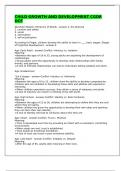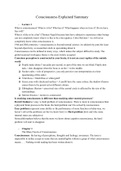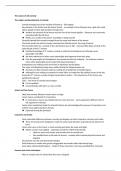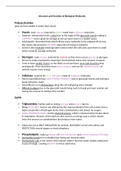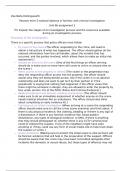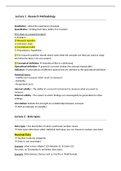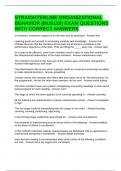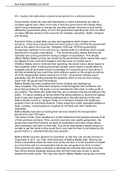DCF
Abraham Maslow: Hierarchy of Needs - answer-1. the physical
2. comfort and safety
3. social
4. self-esteem
5. self-actualization.
According to Piaget, children develop the ability to learn in ____ basic stages: Stages
of Cognitive Development - answer-4
Age: Early Adult - answer-Conflict: Intimacy vs. Isolation
Meaning:
>Between the ages of 18 to 35, young adults are exploring the development of
relationships.
>Young adults need the opportunity to develop close relationships with family,
friends, and partners.
>A lack of intimate relationships can lead to individuals feeling isolated and alone.
Age: Gradeschool
*1st 4 stages - answer-Conflict: Industry vs. Inferiority
Meaning:
>Between the ages of 6 to 12, children show the ability to develop competencies.
Children who are inhibited in developing these skills and abilities will experience
inferiority.
>When children experience success, they attain a sense of adequacy and pride.
>A lack of industry can result in a feeling of low self-worth.
Age: High School - answer-Conflict: Identity vs. Role Confusion
Meaning:
>Between the ages of 12 to 18, children are attempting to define who they are and
where they are going.
>When children are given the opportunity to develop their own ideas and opinions,
they can form their own identity.
>A lack of identity will lead to confusion about who they are.
Age: Infant - answer-Conflict: Trust v. Mistrust
Meaning:
>Trust is developed over time by providing an infant with a consistent, comforting
environment.
>When needs are met, trust is established.
>Trust builds an emotional foundation.
>A lack of trust can result in poor emotional stability.
Age: Late Adult - answer-Conflict: Integrity vs. Despair
Meaning:
>After the age of 65, adults seek meaning in their lives.
, >Adults are reflecting on their accomplishments and fulfillment in life.
>A lack of achievement may lead to despair in the final years.
Age: Middle Adult - answer-Conflict: Generativity vs. Stagnation
Meaning:
>Between the ages of 35 to 64, adults are seeking a sense of accomplishment in
life through family and career.
>Adults need to see progress in their careers or success in their contributions to
society.
>A lack of accomplishment often leads to feelings of resentment and regret.
Age: Preschool - answer-Conflict: Initiative vs. Guilt
Meaning:
>Four- or five-year olds begin to develop an interest in exploring beyond
themselves.
>Children who are not allowed to pursue their natural curiosity will be prone to feel
guilt for their actions.
>When initiative is encouraged, a person experiments within one's environment.
>A lack of encouragement for initiative can result in a feeling of guilt for acting on
one's natural curiosity.
Age: Toddler - answer-Conflict: Autonomy vs. Shame and Doubt
Meaning:
>Toddlers need to explore their own bodies and environment in order to become
confident about themselves.
>When autonomy is allowed, a person can become comfortable with his/her
choices.
>A lack of autonomy can result in a feeling of shame or insecurity.
Approaches to Learning - answer-The ____ Domain refers to a child's eagerness to
learn. It includes curiosity, persistence, creative problem solving, and the ability to
create and complete long-term projects.
Cognitive Development and General Knowledge - answer-The ____ Domain refers to
a child's intellectual or mental abilities. It involves exploration, discovery, concept
and memory formation, problem solving, and creative expression. It includes
knowledge of mathematics, scientific thinking, awareness of social studies, and the
arts.
Concrete-Operational: 7-11 years old - answer-Children become more rational in
their thinking. For example, realizing that Santa Claus probably doesn't exist.
Development - answer-is uneven, as children do not progress in all skills at the
same time; a child grows and learns as a whole, not in pieces. Skills such as sitting
up, grasping, or walking are examples of increasing maturation.
Development - answer-typically refers to an increase in complexity, a change from
relatively simple to more complicated. Development usually involves a progression
along a continuous pathway on which the child acquires more refined knowledge,

